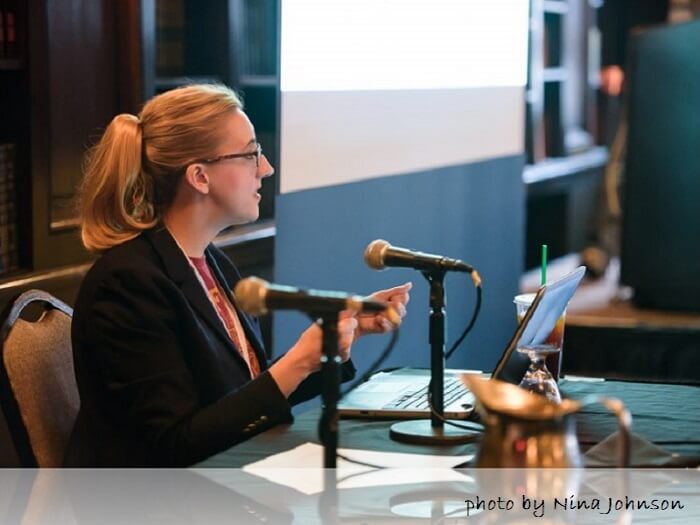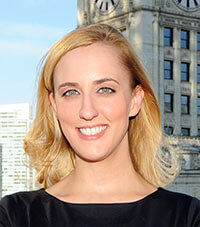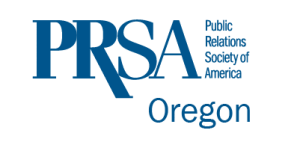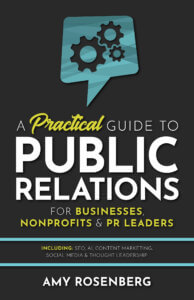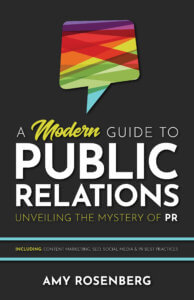An Insider’s Look at Link-Building through PR
As part of our deep dive into all things digital PR, I took advantage of the profound thinkers while I was at Engage. My firm was on its eighth iteration of handling the PR for the digital marketing conference in Portland where I also happened to be presenting on the topic of “PR Your Way to the Top of Google.”
Carolyn Shelby was kind enough to sit down with me after presenting a “He Said, She Said” session with her husband, Dave Rohrer, on SEO. No, she’s not insane enough to start a business with her husband but they do enjoy presenting together. He owns a boutique digital marketing agency in Chicago called North Side Metrics specializing in SEO and PPC. While she is the Director of SEO for Tribune Interactive, which provides digital support for 10 daily newspapers (such as the Chicago Tribune, New York Daily News and the Baltimore Sun), tons of community papers and a handful of foreign newspapers.
At Tribune Interactive, Carolyn oversees all technical aspects to ensure each newspaper communicates with the search engines optimally. Not only does this protect each entity’s search rank, but her policies are also meant to protect Tribune Interactive’s sponsored content clients.
Protecting the Clients from Themselves
According to Carolyn, if Tribune Interactive allowed sponsored content clients to place as many links as they wanted, the newspapers would turn into what Carolyn calls a “link farm.” This free-for-all can actually damage their clients’ search results, resulting in penalties from Google. She tells us what to look out for in this capacity and explains why some online publications only allow you to link to an author’s biography at the end of a contributed article for example or only to a website’s homepage.
“Google is very sensitive to the concept of buying links. Do not buy backlinks. Not only is it bad, but Tribune Interactive doesn’t want to create the impression that we’ve been buying links.”
Carolyn’s linking policies for sponsored content:
- Websites are only allowed two links
- The two links can’t both go to the same page
- Links should generally go to the organization’s name to avoid “over-optimized” content.
Trying Too Hard with SEO
When I asked for some clarification on what this phrase “over-optimized’ meant, Carolyn explained how Google will look at the totality of a website’s back links and the anchor text (the blue part that you click on to be directed to another page/website). Sites are considered over-optimized when the anchor text only links to sales or call-to-action pages. But it isn’t considered over-optimizing when what’s being sold is part of the organization’s name.
Press Release Link Farm Frenzy
About five years ago it seemed that all anyone wanted from PR people was a mediocre press release posted to press release distribution sites. Veracity was one of the first to point out that the resulting “hits” they brought back weren’t real news. Many of them were going to “fake” websites that weren’t related to any news sources at all.
“Google considered it to be a free-for-all link farm. So many people were abusing this, press releases became meaningless. Today we don’t consider links from these sources to have any value at all,” Carolyn says. “Google said it doesn’t matter where your release is. You can only have two links and one must go to your home page. But if you are continuing to abuse it to the point that it affects your backlink profile, you might get penalized.”
This is where real, old-school PR comes back into fashion. Keep in mind that nothing is actually old-school now because most of our work in print and broadcast also ends up online. I’m always talking about the old-school PR mentality when I use this phrase.
Community News vs. High-Profile News
When I asked if getting links from high profile sites like the LA Times versus local community newspapers, Carolyn assured me that it’s sometimes even more valuable for locally-based organizations to garner links from community newspapers. Any newspaper appearing in Google News (type its name in Google News to see if it comes up) is valuable. Carolyn goes on to remind us that we all have local hooks (our hometown, college town, etc.) and if we can “re-write the hook” each time to relate to each customized local angle, not only will our chances of landing the story increase, it ensures you won’t have duplicate content out there which is an SEO faux pas.
Managing Where Journalists Link Out
Tribune Interactive journalists decide where to link within their stories. Carolyn says she encourages them to link internally “because it’s good for the crawlers.” Her one rule is that they cannot link to conversion pages. While she doesn’t change their stories, she will bring something to a journalist’s attention if they’ve done something she disapproves of. We hear a story about how a journalist got fired for being paid to “drop” obscure links to sites having nothing to do with the story they were writing about. So at the end of the day, the buck ultimately stops with Carolyn.
Want to learn more? You can catch Carolyn at The Social Shake-Up — which represents the intersection of marketing, public relations and social — in Atlanta this May 7 – 9.
About the guest: Carolyn Shelby
Carolyn has been professionally designing/building websites and helping businesses of all sizes integrate their offline and online marketing efforts since 1994. She specializes in organic SEO, content marketing, and helping businesses rebuild under-performing (or just ancient) websites while preserving existing inbound links and search engine rankings.
Carolyn is currently the Director of SEO and SEM for Tribune Publishing, and works on the Chicago Tribune, the LA Times, and six other Tribune newspapers including a number of other digital properties around the US.
Connect and follow Carolyn on social media:
This episode of PR Talk is brought to you by PRSA Oregon
Throughout Oregon and Southwest Washington, PRSA provides members with networking, mentorship, skill building and professional development opportunities – whether you are a new professional fresh out of college or a skilled expert with 20 years in the industry. Check out PRSAoregon.org for more information on how membership can help you grow and connect.
PR Talk is sponsored by monday
In such a fast-paced, multi-faceted work environment, it can be tough to stay on top of everything. monday is the collaboration tool trusted by businesses of all kinds to help cut down the clutter and streamline productivity. Learn more at monday.com and signup for a free trial. You’ll see in no time why so many teams around the world are choosing monday for their project management needs.
PR Talk listeners can use the coupon code BetterExecute for a 15% discount.

